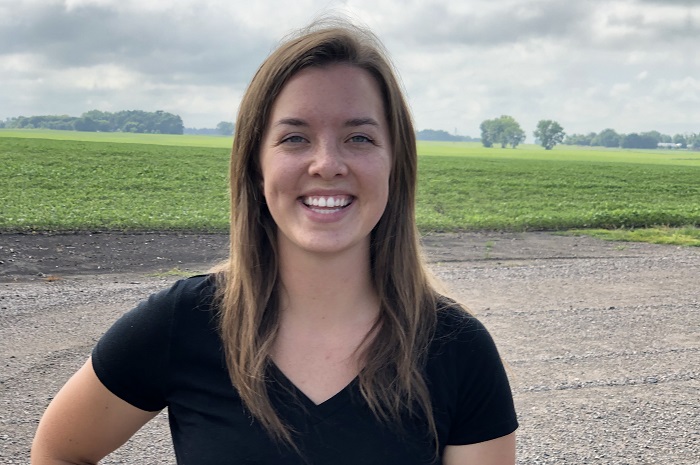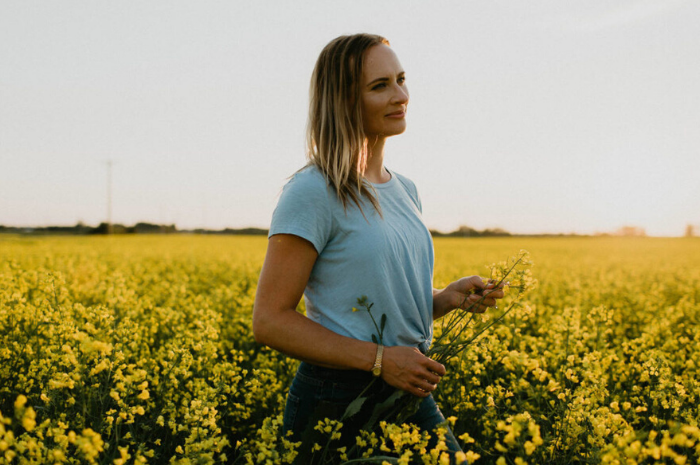Growing up on the family farm, Brooke Hoffbeck wanted to be a part of it, even at a very young age.
Located outside Morgan, Minnesota, in Redwood County, it was the same farm where her father, Chad, grew up, and the same farm that’s been in their family for more than 100 years — one of more than 10,000 operations recognized in Minnesota as a century farm.
When Hoffbeck was very small, her desire to have an active role on the farm showed up on her Christmas list, of all places.
“I am told that when I was three years old, the one thing I wanted for Christmas was a pair of pig boots, so I could help in the barn with chores,” she says.
Why pursue a career in agriculture?
In 2019, as a senior at Cedar Mountain High School, she’s running toward a career in agriculture. Not fleeing; even as producers all around her struggled to break even through grim commodity prices throughout her entire high school career. This fall, she’s heading to South Dakota State University to study agronomy and precision agriculture.
Some people wonder why. But to her, there’s no question. She loves agriculture, and the many things she's accomplished in FFA have shown her she has a great aptitude for it.
“I think it does scare some people,” she says. “We can’t live without agriculture, either. We need people to go into those careers even when it's tough.”
Unlike many youth who are entering college still figuring out what works for them, Hoffbeck will arrive with real-life experience in her chosen field, and at a level that is, frankly, pretty impressive.
Aside from helping on the farm and showing cattle and sheep, she’s also helped with the family's seed and precision equipment business. In her role, she visits customers, conducts different research studies in the field, shares data with seed company employees and does crop scouting.
On the farm, she cultivates a corn-soybean rotation on a small acreage. This spring will be her third planting season. The difference between this project and helping her father in the field is that every single decision is hers: hybrid variety, plant depth, crop insurance rate and spraying.
“That was a change, to make the decisions myself rather than just be told what to do,” Hoffbeck says. And even though her aim isn’t to be a full-time producer, making these decisions helps her understand what farmers face every day, which will help her career.
One thing she knows now is the thrill of the harvest season.
“It’s just so great to know that after we worked hard, the harvest is going to feed our animals and it's going to put food on people's tables,” she says.
The making of a leader: Finding her stride in FFA
Another area that helped her develop and grow her agriculture abilities was FFA. In fact, you might say FFA was where she tapped into her passion for agriculture. Hoffbeck loves telling the story about how she got her start. When she joined in eighth grade her efforts were, at best, half-hearted.
“I knew my parents had been in it and I thought it’s something I have to do because they did it,” she says.
The night of the spring banquet, where her father, Chad, was being honored by the FFA for his contributions, Hoffbeck turned to her mother, Shannon, and said, “I think I’ll just stick to sports. And I’ll help on the farm when I’m at home.”
Though her mind was made up that FFA was not her scene, her parents encouraged her to give it another try. And in ninth grade, a spark was lit.
It happened when she went to her first leadership conference. Seeing the high-ranking regional officers speaking in front of the group, combining agriculture and leadership, something clicked. “I was like, 'Wow, this is super cool, actually.'”
After that, she succeeded beyond her wildest dreams in the crops contest. Alongside the junior and senior boys, she studied plants, seeds and weeds and participated in practice heats. When contest day rolled around, she not only beat everyone on the team, she had the third best score in the region. “That’s what really got me excited about FFA,” she says.
From there, things began taking off for Hoffbeck. She quickly became vice-president of her chapter, and eventually, president. There were soil contests, public speaking conferences, and by her sophomore year she was elected region secretary.
Then came junior year when she was elected region president. “There have only been four region presidents from my school and one of them was my dad,” she says. “He dug out his old jacket and we tried them on next to each other. So that was a proud moment for us.”
From there, as Region 5 President of FFA Minnesota, she served as national delegate at this year’s National Convention.
“It’s just crazy to look back on when I told my mom I didn’t think I wasn’t going to do it and now I just can’t even imagine my high school career without FFA,” Hoffbeck says. “It’s really helped me a lot in gaining confidence and leadership skills and learning more about agriculture.”
Hoffbeck is grateful to her “amazing” parents, who always believed in her, along with the FFA officers who inspired her along with the mentors and coaches who helped her along the way. Last summer, Hoffbeck got a chance to pay it forward by helping a younger student prepare for an officer election. “We texted back and forth and ran through some practice questions. When she found out she got the officer position … that was a happy moment. It defined why I wanted to be an officer in the first place.”
Gauging the future of agriculture
Looking ahead, Hoffbeck has her eyes open to the fact that fewer people in her generation are pursuing farming. But as technology continues to advance, the farmer's ability to adapt to it will be key. That’s why it's important for kids to have a good education in STEM subjects (science, technology, engineering and math), she says.
“With our population growing so quickly and the number of fewer farmers now, we’re going to need that technology to produce those larger crops in order to feed these growing populations,” Hoffbeck says.
Studying agronomy will be a good fit for Hoffbeck, she says, because she can combine research with her people skills to help farmers succeed.
Rather than selling a product, “I’m doing the research and explaining the research almost in a way that I’m selling through the research,” Hoffbeck says. “But also my goal would be to help farmers be sustainable and prepare for that next generation while making a profitable crop to keep them going — a safe, nutritious crop for our population.”
And as technology and science continues to evolve in the agriculture field, Hoffbeck sees even more possibilities for her future.
“Maybe I’ll have a job someday that doesn’t even exist right now.”
For more information on the #WomenInAg series, please see our related blog posts:
Jacqui Cottrell "Queen of Quinoa"
Ag lenders find meaning in role as farmers' trusted adviser
Ann Vote connects teachers to bigger lessons in agriculture
Jessie Alt's farm roots take her to an enriching career of plant breeding
Be sure to check back on our blog to hear more from Women in Agriculture.


